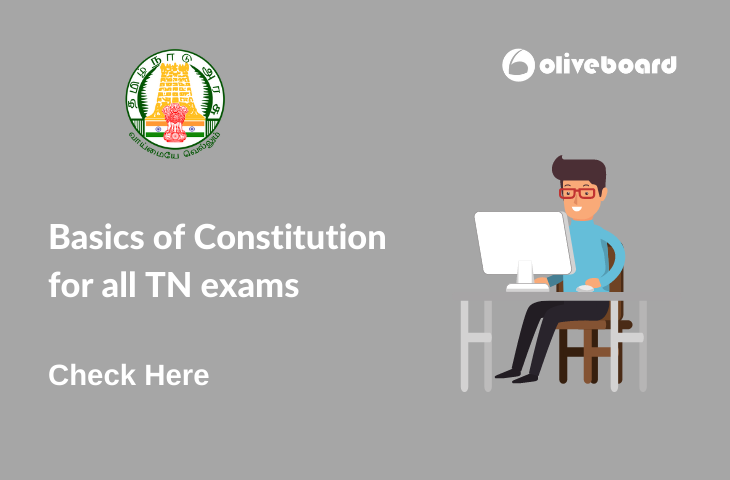TNPSC has released its annual planner 2022. Notifications of various group exams can be expected soon. To help you in your preparation, we have come up with a study blog on the topic Basics of Constitution to help you in your preparation.
Basics of Constitution e-book | Download link
Click on the link provided below to download the e-book.
How to Download Free e-book PDF?
- Click on the given download link for Tamil and English. You will be taken to Oliveboard’s FREE Ebooks Page. Alternately, you can download the Oliveboard Android App to access these on your smartphone.
- Register/Login on to the Free E-Books Page of Oliveboard (It is 100% free, You just enter your valid email id and a password to be able to download the PDF).
- Once logged in you’ll see the message “Please click here to download the Free Ebook“. Click on the message to download that particular ebook.
Basics of Constitution | For TNPSC
What is a constitution?
- A constitution is a body of fundamental principles.
- These principles form the basis for the governance of a state.
Functions performed by the Constitution
1. Coordination and Assurance
In society, individuals live in a group. Hence, there is a need for some basic consensus on living together.
- The need for consensus arises due to threat posed by one individual to another in a group. Absence of written rules can mean chaos and anarchy in a group.
- Each individual would constantly be under the threat of domination and subjugation by another individual or group.
- This consensus comes in the form of basic rules. These basic rules lay down the norms of behaviour by each member of the group.
- And these rules need to be legally enforceable i.e they should be made compulsory for everyone to follow.
These basic rules enable the group to achieve a minimal degree of coordination.
So, the first function of a constitution is to provide a set of basic rules that allow for minimal coordination amongst members of society.
2. Decision-making Powers
The constitution specifies the basic allocation of power in a society.
- It is the responsibility of the Constitution to confer law-making powers.
- In a monarchical constitution, a monarch decides and in some constitutions like the old Soviet Union, one single party was given the power to decide.
- But in democratic constitutions, the people decide. In the Indian Constitution, Parliament decides laws and policies on behalf of people.
- It acts as a fundamental law, bestowing the authority of making laws on the Parliament.
- The constitution is an authority that constitutes the government in the first place.
The second function of a constitution is to specify who has the power to make decisions in a society. It decides how the government will be constituted.
3. Limitations on the powers of government
The third function of a constitution is to set some limits on a government. These limits are fundamental. The government may never trespass on them.
- This is one of the most important functions of a Constitution.
- Government is the only institution which has a coercive influence on the citizens. The use of this coercive power needs to be restrained.
- Specifying certain fundamental rights is the most common way of limiting a government’s powers. Fundamental rights are available to all citizens and no government can violate these fundamental rights.
- Some universal rights include protection from arbitrary arrest without any reason, freedom of speech, freedom of conscience, freedom of association, freedom to conduct a trade or business,etc.
- In practice, these rights can be limited by imposing reasonable restrictions and during certain specific circumstances like Emergency,etc.
4. Fulfilling the dreams and goals of the people
- Many modern-day Constitutions provide an enabling framework for the government to express the aspirations and goals of society.
- There are various inequalities deeply entrenched in society. Such societies have to set limits on the power of government, at the same time, these governments have to take measures to reduce the inequalities.
- For example, India and South Africa aspire to create a society that is free of caste and racial discrimination respectively. In this respect, the Constitutions of the respective countries lays down some special measures in this regard.
So, the fourth function of a constitution is to enable the government to fulfill the aspirations of a society and create conditions for a just society.
5. Identity of people
The fundamental identity of people is expressed by the Constitution. The Constitution embeds the identity of the people as people come together collectively as one entity.
- There are a certain basic set of norms which decide about various aspects of governance like mode of election, type of government, etc. This leads to a collective identity.
- Constitution creates thepolitical identity of an individual. It erases the past identities of the individual.
- Constitution also sets constraints on the behaviour of individuals. It lays down some norms of behaviour which are not violated by the individual.
- It thus gives a moral identity to the individuals.
- It should be noted that the Indian Constitution does not make ethnic identity a criterion for citizenship.
Download the free ebook on Basics of Constitution for complete information on the topic for TNPSC exams. For guidance and practice for TNPSC exams, download the Oliveboard app.
Also Check:
- 100+ Free Mock Tests
- Oliveboard Mobile App
- Oliveboard’s discuss forum
- Oliveboard Telegram Group
- Download BOLT – Our Monthly General Awareness free e-book
Hi, I’m Tripti, a senior content writer at Oliveboard, where I manage blog content along with community engagement across platforms like Telegram and WhatsApp. With 3 years of experience in content and SEO optimization, I have led content for popular exams like SSC, Banking, Railways, and State Exams.
